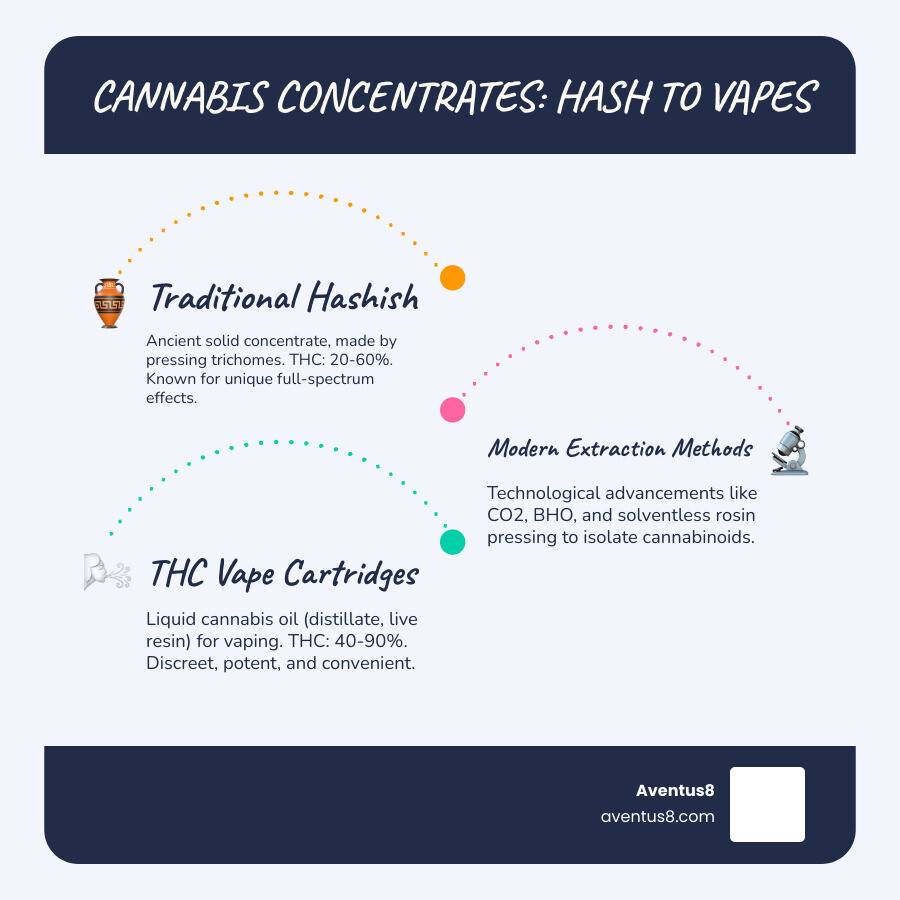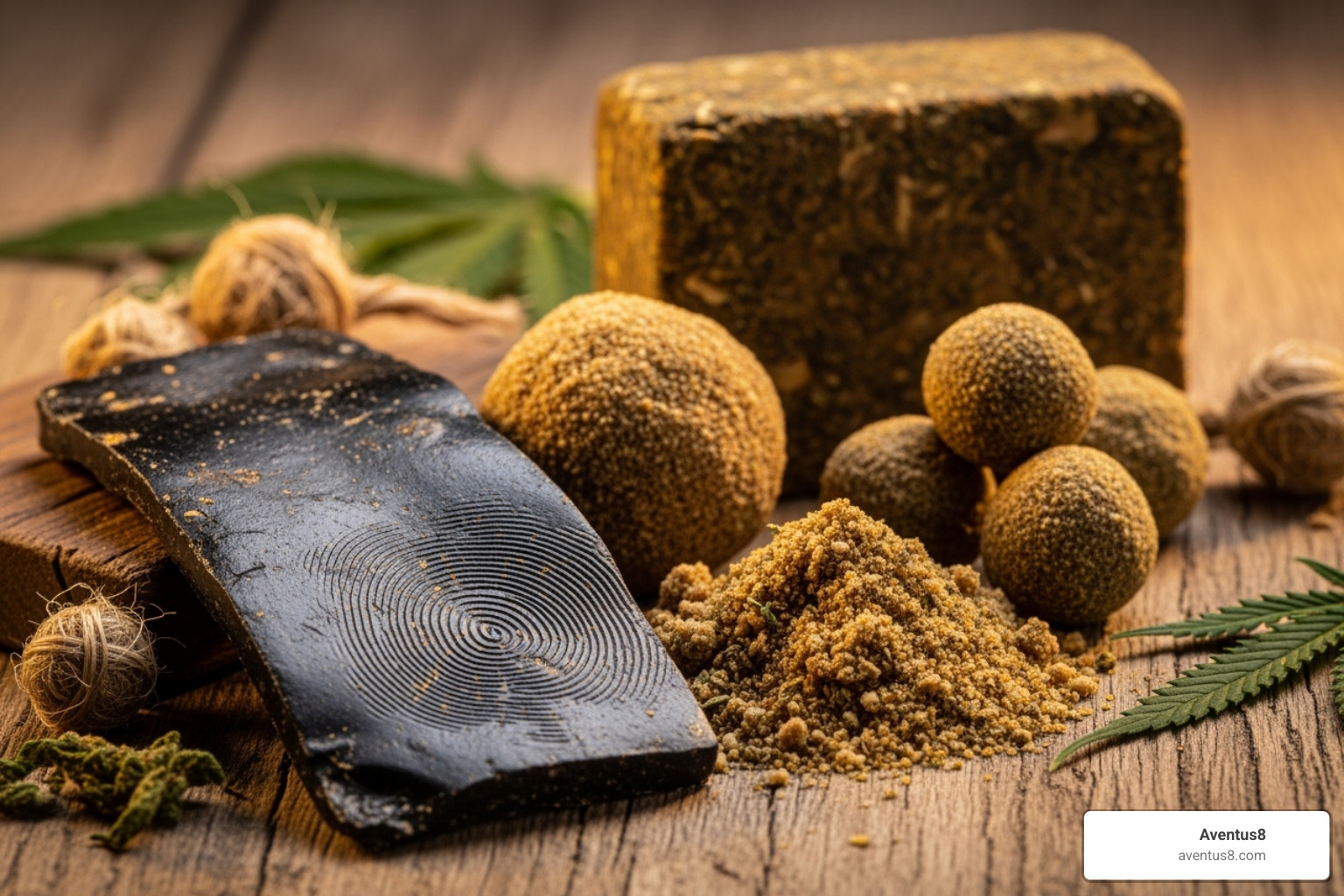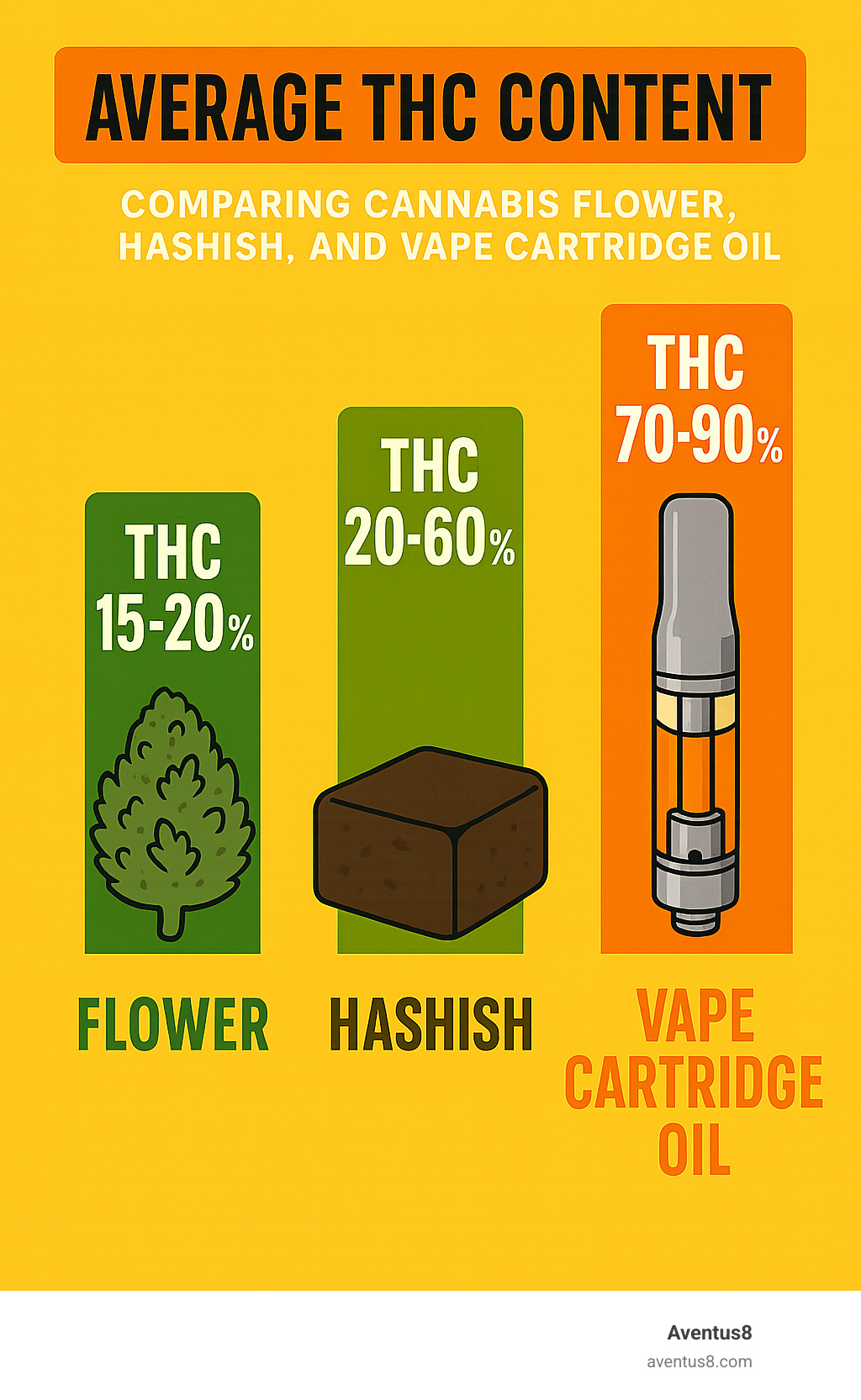Hash It Out: Are THC Vape Carts Just Modern Hashish?
Understanding the Cannabis Concentrate Confusion
Are THC vape cartridges considered hashish? This question puzzles many cannabis consumers in Hollywood, FL, as concentrates grow in popularity. The short answer is no. While both are cannabis concentrates, they are distinct products with different production methods, forms, and characteristics.
Quick Answer:
- Traditional Hashish: Solid, pressed resin made from trichomes (20-60% THC)
- THC Vape Cartridges: Liquid cannabis oil in cartridges (40-90% THC)
- Key Difference: Physical form, extraction method, and potency levels
- Legal Classification: Both are cannabis concentrates but regulated differently
The confusion is understandable. Both products concentrate the potent compounds from cannabis, but that's where the similarities end. Traditional hash involves pressing trichomes into solid blocks, while vape cartridges contain liquid oils extracted through modern chemical processes.
This distinction matters for legal compliance, dosing, and consumer safety. As the cannabis market in Florida evolves, understanding these differences helps you make informed choices.
As Max Shemesh, CEO and founder of Aventus8 in Hollywood, FL, I've spent years helping consumers understand the nuances of cannabis concentrates. My experience has shown that education about these distinctions is essential for safe, legal consumption.

What is Traditional Hashish? A Look Back
To understand why THC vape cartridges aren't hashish, we must first look at traditional hash. As the original cannabis concentrate, hash has a history stretching back centuries, making today's vape pens seem futuristic. While you might find various concentrates at dispensaries around Hollywood, FL, hash remains the original.
Hashish is made from trichomes—the tiny, crystal-like glands on cannabis buds that produce cannabinoids and terpenes. Traditional hash is a concentrated collection of these trichomes, separated from the plant and pressed into a solid form.
Production methods are simple and physical. Dry-sift involves sieving dried cannabis to collect kief (powdery trichomes), which is then pressed into blocks. Charas is an ancient technique of hand-rubbing live cannabis plants to collect sticky resin. Bubble hash uses ice water to freeze and separate trichomes, which are then collected through mesh bags, creating a cleaner product.
Traditional hashish potency varies from 15% to 65% THC, depending on the source and method. This is stronger than flower but generally less potent than the oils in modern vape cartridges popular in Florida's market.
Understanding this history helps clarify why asking are THC vape cartridges considered hashish is a misconception. They are both concentrates but represent entirely different eras of cannabis technology.
The Composition of Classic Hash
The magic of hash lies in its resin glands (trichomes), which contain a complex mix of cannabinoids and terpenes. THC provides psychoactive effects, while other compounds contribute to the entourage effect, where the combined effect is greater than the sum of its parts.
Traditional production uses physical separation, not chemical extraction. This means trichomes are mechanically removed without solvents. While this method may leave small amounts of plant matter, it preserves the plant's natural character. The appearance and texture of hash are solid, often dark brown, and can be waxy, crumbly, or pliable—a far cry from the clear, golden oils found in vape cartridges around Hollywood, FL.

Deconstructing the Modern THC Vape Cartridge
Fast forward to the 21st century, and we have THC vape cartridges, which are incredibly popular in markets like Hollywood, FL. They represent convenience, discretion, and technological advancement.
A THC vape cartridge is a pre-filled container of cannabis oil used with a vape pen. This portable electronic device consists of a battery that powers a heating element (atomizer), which vaporizes the oil in the cartridge for inhalation. This process avoids combustion, meaning no smoke or ash, making it a highly discreet consumption method—a major benefit for our customers in Florida.
The popularity of vape cartridges is due to several factors. They are portable, easy to use, and fit in a pocket or purse. Their discreet consumption is a key draw, as the vapor dissipates quickly with minimal odor. This makes them ideal for on-the-go use, whether at home or navigating the vibrant streets of Hollywood, FL.
Types of Oil Found in Vape Carts
The liquid inside a THC vape cartridge comes in various forms, each with unique characteristics.
THC Distillate: This is a highly refined oil where THC is isolated, often reaching 90% potency or higher. The process removes natural terpenes, so they are often added back in to provide flavor. These can be cannabis-derived terpenes (from cannabis) or botanical terpenes (from other plants).
CO2 Oil: Produced using supercritical CO2 extraction, this method is considered clean as it leaves no harmful residues. It can sometimes remove lighter terpenes, which may be added back later.
Live Resin & Full-Spectrum Extracts: For a more robust, "whole plant" experience, these are top choices. Live resin is made from flash-frozen cannabis plants to preserve a wide array of cannabinoids and terpenes, capturing the essence of the living plant. Full-spectrum extracts aim to retain the complete profile of the original strain to maximize the "entourage effect."
Other Concentrates: While less common in pre-filled carts, modern concentrates like hash oil (made with solvents) or rosin (a solventless extract) can also be found in vapeable forms.
Production and Potency: A Tale of Two Concentrates
The production process is where hashish and vape oils diverge completely, defining their potency and composition. This is the core reason why the answer to are THC vape cartridges considered hashish is a firm no.
Traditional hashish relies on mechanical separation. Methods like dry-sifting, hand-rubbing (for Charas), or using ice water (for bubble hash) physically detach the resin glands from the plant. These trichomes are then pressed, often with heat, into a solid. These low-tech techniques avoid harsh chemicals, appealing to cannabis purists in the Hollywood, FL, community who prefer a natural product.
In contrast, the oils in THC vape cartridges found in Hollywood, FL, dispensaries are typically made with advanced, solvent-based extraction. Florida's strict medical cannabis regulations favor methods like CO2 extraction, a cleaner alternative that uses supercritical carbon dioxide and leaves no residue, ensuring patient safety. Butane Hash Oil (BHO) extraction is another method, though it requires professional purging to remove all residual solvent to meet state safety standards.
Not all modern oils use solvents. Solventless extraction methods, like a rosin press, use precise heat and pressure to squeeze pure resin from cannabis flower or hash. Rosin is a top-tier product increasingly sought after by discerning consumers in the Hollywood, FL, market for its clean profile and preserved terpenes.
| Feature | Traditional Hashish | THC Vape Oil (Cartridge Content) |
|---|---|---|
| Production Method | Mechanical separation (dry sift, ice water, hand-rubbing) | Solvent-based (BHO, CO2, Ethanol) or Solventless (Rosin Press) |
| THC Potency | 15% - 65% | 40% - 99% (average 70-90%) |
| Terpene Profile | Full-spectrum, naturally preserved | Can be full-spectrum (live resin) or isolated (distillate) |
| Common Form | Solid, waxy, pressed brick or ball | Viscous liquid oil |
How Potency and Effects Differ
The most noticeable difference for consumers in Hollywood, FL, is the gap in potency and effects.
Modern THC vape cartridges contain highly concentrated oils with THC levels from 40% to over 90%. The hash oil in many vape carts available in the Hollywood area easily hits 90% THC purity, which is four times stronger than typical cannabis flower (~20% THC).
In contrast, the THC content of traditional hashish is lower, typically ranging from 15-20%, though high-quality hash can reach up to 65% THC. This is a significant difference from modern products, reflecting a trend of Changes in Cannabis Potency over the Last Two Decades. Even the best traditional hash rarely matches the average THC levels in today's vape oils.
This potency difference directly impacts the user experience. A Hollywood, FL, patient might choose a high-THC vape for potent, fast-acting relief at home, while opting for traditional hashish for a more mellow, nuanced experience during a relaxing afternoon at ArtsPark at Young Circle. Vaping provides a rapid onset that can feel much more intense, so careful dosing is essential. Traditional hashish, with its broader cannabinoid profile, may offer a more rounded experience due to the entourage effect, a stark contrast to the intense kick from high-THC vape oils.

So, Are THC Vape Cartridges Considered Hashish?
Let's get straight to the point: no, THC vape cartridges are not considered hashish—not technically, legally, or in common use.
While both are potent cannabis concentrates, the similarities end there. The confusion is understandable, but they are fundamentally different products.
Legal definitions help clarify this. The 1961 UN Single Convention on Narcotic Drugs defines hashish as "the separated resin, whether crude or purified, obtained from the cannabis plant." This definition implies a physical separation process, aligning with traditional hash-making, not the chemical extraction used for vape oils.
THC vape cartridges contain cannabis oils (distillates, live resins, etc.) that exist in liquid form. The term "cannabis concentrate" is a broad umbrella that covers both hashish and vape oils. In Hollywood, FL, dispensaries correctly label and categorize these products based on what they are.
This distinction has real-world implications for regulation, taxation, and sales. Florida's medical cannabis program regulates these products as different categories of concentrates, not as interchangeable forms of hashish.
From a Technical Standpoint, are THC vape cartridges considered hashish?
Technically, the answer is a clear no. The differences start with their chemical composition. Traditional hash retains the plant's natural balance of cannabinoids and terpenes. In contrast, vape oils, especially distillates, are often refined to isolate THC, reaching purities of 90% or more. Terpenes are often added back later, which isn't the same as the original blend.
The physical form is another obvious difference: solid hash versus liquid oil. You can't press distillate into a brick or pour hash into a cartridge.
The biggest technical distinction is the extraction process. Traditional hash uses mechanical separation. Vape oils typically involve chemical solvents (butane, CO2, ethanol) that dissolve the active compounds. Even solventless rosin uses heat and pressure to transform the material into a liquid. These technical differences mean they are as different as ice and steam—same source, different end products.
From a Legal and Practical View, are THC vape cartridges considered hashish?
Legally and practically, THC vape cartridges are classified as "marijuana concentrates" or "cannabis oils," not hashish. This is crucial for anyone navigating Florida's medical cannabis laws.
While cannabis is federally illegal, Florida's medical program has specific product categories. At a licensed dispensary in Hollywood, FL, vape cartridges are labeled as oils or concentrates. These classifications determine taxation and possession penalties. Florida's laws are written for modern products, ensuring they meet specific testing and labeling standards.
For consumers, this means a vape cartridge from a licensed Florida dispensary is a lab-tested, regulated product with clear potency and safety information. This is different from traditional hash, which may be unregulated.
Why terminology matters is clear when considering legal consequences. The Brittney Griner case in Russia, which involved hashish, highlights how specific definitions have serious implications. For Florida patients, understanding that vape carts are not legally hashish helps ensure compliance with state regulations. The bottom line is that while both serve similar purposes, they exist in different legal and practical categories for good reason.

Navigating the World of Concentrates in Hollywood, FL
Navigating the concentrate market in Hollywood, FL, can be overwhelming. Whether you're considering traditional options or wondering are THC vape cartridges considered hashish, understanding quality is key to making an informed decision.
Choosing quality products is about safety, consistency, and value. The foundation of a good purchase is lab testing. Every legitimate cannabis product should come with a Certificate of Analysis (COA).
Reading a COA reveals the cannabinoid and terpene profiles, with exact percentages of THC, CBD, and other compounds. Most importantly, it confirms the product is free from contaminants like pesticides, heavy metals, residual solvents, and mold.
Avoiding harmful additives is critical. The 2019 EVALI outbreak was linked to Vitamin E acetate, a thickening agent that is toxic when inhaled. Other additives like propylene glycol can also create toxic compounds when heated. Always check ingredient lists and COAs to ensure your vape oil is free from these diluents.
Identifying legitimate vs. illicit market products is crucial for safety. Florida's regulated medical cannabis program requires dispensaries to test all products. Illicit market products, often sold without transparency, may contain dangerous cutting agents or have inaccurate labeling. If a deal seems too good to be true or lacks lab results, it's a major red flag. At Aventus8, we are committed to providing only lab-tested, high-quality products to our Hollywood, FL community.
What to Look For on the Label
When examining a THC vape cartridge, the label tells you everything about its quality and safety.
Cannabis-derived vs. botanical terpenes: Cannabis-derived terpenes offer authentic flavors and effects. Botanical terpenes are from other plants and are sometimes used to mask lower-quality oil.
Full-spectrum vs. distillate: Full-spectrum extracts (like live resin) preserve the plant's complete profile for a more nuanced "entourage effect." Distillates are highly refined, containing mostly isolated THC.
Potency labeling: The label should show exact percentages of THC, CBD, and other cannabinoids. Be wary of vague claims.
Manufacturing information: Look for the producer's name, batch numbers, and a QR code or link to the COA. This transparency shows the brand stands behind its product, a standard we uphold at Aventus8 in Hollywood, FL.
Conclusion
So, are THC vape cartridges considered hashish? The definitive answer is no.
Traditional hashish is a solid concentrate made by physically pressing trichomes, with a rich history and THC content between 15-65%. THC vape cartridges contain liquid cannabis oils produced with modern extraction methods, boasting 40-99% THC and designed for discreet, convenient use, which has made them popular in Hollywood, FL.
While both are cannabis concentrates, they are not interchangeable terms. Think of hashish as handcrafted cheese and vape oil as a precisely engineered supplement. Both have their place, but they are fundamentally different.
Understanding this distinction is essential for making safe, informed decisions about legal compliance, dosing, and what you consume. Knowing that the answer to are THC vape cartridges considered hashish is no helps you steer the cannabis world with confidence.
At Aventus8, we are passionate about empowering consumer knowledge. We are dedicated to providing safe, rigorously lab-tested cannabis products to our Hollywood, FL community. Every item meets strict quality standards, giving you peace of mind.
The cannabis industry is evolving rapidly. By understanding the real differences between products, you're better equipped to find what works for you.
Ready to explore premium cannabis products with confidence? Explore our full collection of premium cannabis products and find the Aventus8 difference for yourself.

